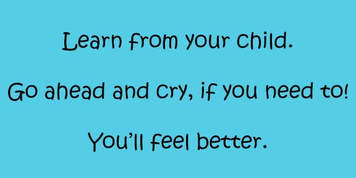|
I've been encountering more and more parents lately who are leaving their children with a caregiver to go back to work. It's become a necessary part of our lives in these modern times, but it doesn't make it any easier to do. I always try to remind those parents that it is probably harder on them than it is on their children. Kids love to be social. Babies who live in isolation often become socially awkward. They haven't learned how to interact with people other than their immediate family. None of us are born shy. We are born seeking the attention and approval of those around us. You can see that when you observe newborns. They are constantly seeking eye contact, reaching out to us with their eyes.
Even the most well-meaning parents can create shy children by keeping them away from others. Of course, we want to protect our children, but it's important not to overprotect them. Eventually, every child has to go out into the world, whether it's going to school, on a playdate or other activities without parental protection. It's a very good thing for children to have activities they do alone. That's what teaches them to navigate this wide world. Unfortunately for me, I didn't learn this until I was an adult and, as a result, made some very bad and dangerous choices. Luckily, I survived the consequences of my well-meaning parents' mistake, but many don't. So ... what does this have to do with parents going back to work? Everything! It takes a village to raise a child. Humans have known this for thousands of years. Relief for the parents is not the only reason for this. It is also for the well-being of the child. We are all very different. We have different styles of living and relating to each other. And, we encounter those varieties of styles in our lives. Don't we want our children to be prepared for that, as well? When a parent is forced to go back to work, they are forced to use the "village." It's a good thing. But, with the age of the nuclear family, we've forgotten how important it is to leave our children with friends, neighbors and relatives, and with elders who will impart their wisdom. If we only expose our kids to these rich resources when we are present, they will not get the same benefit. They will only get what we feel comfortable with, or what transpires from the relationship between the adults. I hear many tales from children about the wonderful times they have with their grandparents. As a grandparent myself, I know that I am very different with my grandchildren than their parents are. I have different rules. I eat different foods. I do different activities with them, and I teach them different things. It's not harmfull to them, it's helpful. It's the same thing when they go to daycare, whether it's a home daycare or an institutionalized daycare setting. They learn to navigate new situations. Now, the big question is, how do parents survive leaving their young children? Talk to other working parents. Don't be afraid to let your friends and family know where you're struggling. And, yes. Cry when you need to. Set your priorities so that spending time with your children is on the top of the list. Try not to focus so much on catching up with chores that you neglect yourself or your children. Try to include them in some of the chores, if they're old enough. A very young child can sort socks out of the clean laundry, or pull out towels to be folded. In that way, you are teaching them life skills and having fun together at the same time. And, don't keep them so busy with extra activities that they forget how to entertain themselves or don't have down time for using their imaginations. It's easy to feel guilty for not having what you think is enough time with them. Children are incredibly resilient and will make the most of what they have. Maybe we can learn from them.
0 Comments
Your comment will be posted after it is approved.
Leave a Reply. |
Archives
April 2019
Categories |


 RSS Feed
RSS Feed